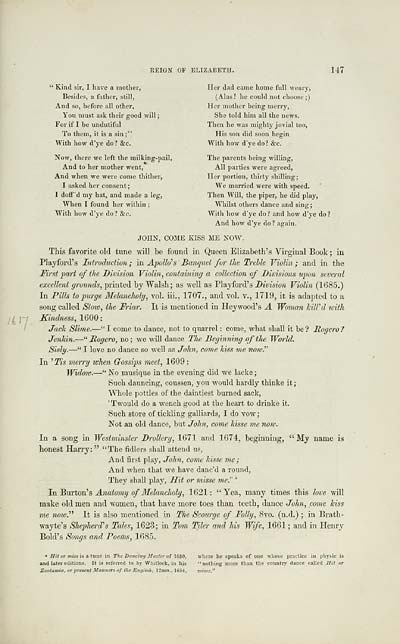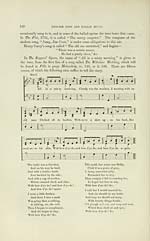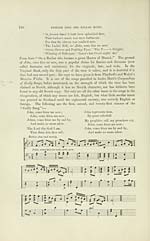Glen Collection of printed music > Printed text > Popular music of the olden time > Volume 1
(181) Page 147 - John, come kiss me now
Download files
Complete book:
Individual page:
Thumbnail gallery: Grid view | List view

REIGN OF ELIZABETH.
147
/^ly.
" Kind sir, I Iiave a mother,
Besides, a father, still.
And so, before all other.
You must ask their good will ;
For if I be un dutiful
To them, it is a sin ;"
With how d'ye do? &c.
Now, there we left the milking-pail,
And to her mother went,
And when we were come thither,
I asked her consent ;
I dofF'd my hat, and made a leg,
When I found her within ;
With how d'ye do ? &c.
Her dad came home full weary,
(Alas ! he could not choose ;)
Her mother being merry.
She told him all the news.
Then he was mighty jovial too,
His son did soon begin
With how d'ye do? &c.
The parents being willing.
All parties were agreed,
Her portion, thirty shilling;
We married were with speed.
Then Will, the piper, he did play.
Whilst others dance and sing ;
With how d'ye do? and how d'ye do?
And how d'ye do? again.
JOHN, COME KISS ME NOW.
This favorite old tune will be found in Queen Elizabeth's Virginal Book ; in
Plajford's Introduction ; in Apollo's Banquet for the Treble Violin ; and in the
I'irst part of the Division Violin, containing a collection of Divisions upon several
excellent grounds, printed by Walsh; as well as Playford's Division Violin (1685.)
In Pills to purge Melancholy, vol. iii., 1707., and vol. v., 1719, it is adapted to a
song called Stoto, the Ih'iar. It is mentioned in Heywood's A Woman kill'd ivith
Kindness, 1600 :
Jack Slime. — " I come to dance, not to quarrel : come, what shall it be? Rogero?
Jenliin. — " Mogero, no ; we will dance The Beginning of the World.
Sisly. — " I love no dance so well as John, come hiss vie now"
In ''Tis merry when Grossips meet, 1609 :
Widow. — " No musique in the evening did we lacke ;
Such dauncing, coussen, you would hardly thinke it;
Whole pottles of the daintiest burned sack,
' Twould do a wench good at the heart to drinke it.
Such store of tickling galliards, I do vow ;
Not an old dance, but John, come hisse me now.
In a song in Westminster Drollery, 1671 and 1674, beginning, " My name is
honest Harry:" "The fidlera shall attend us,
And first play, John, come hisse me;
And when that we have danc'd a round,
They shall play, Hit or misse me." "
Jn Burton's Anatomy of Melancholy, 1621: "Yea, many times this love will
make old men and women, that have more toes than teeth, dance John, come kiss
me now." It is also mentioned in The Scourge of Folly, 8vo. (n.d.) ; in Brath-
wayte's Shepherd'' s Tides, 1623; in Tom Tiler and his Wife, 1661 ; and in Henry
Bold's Songs and Poems, 1685.
■ Hit or miss is a tune in Tke Dancinfj Master of 1650,
and later editions. It is referred to by Wniitlock, in his
Zoolamia, or present Manners of t/ie Eiiglisli, 12nio., 1(>54,
wliere he speaks of one "wliose i)ractice in physic is
"nothing more than the country dance called Hit or
nrissc."
147
/^ly.
" Kind sir, I Iiave a mother,
Besides, a father, still.
And so, before all other.
You must ask their good will ;
For if I be un dutiful
To them, it is a sin ;"
With how d'ye do? &c.
Now, there we left the milking-pail,
And to her mother went,
And when we were come thither,
I asked her consent ;
I dofF'd my hat, and made a leg,
When I found her within ;
With how d'ye do ? &c.
Her dad came home full weary,
(Alas ! he could not choose ;)
Her mother being merry.
She told him all the news.
Then he was mighty jovial too,
His son did soon begin
With how d'ye do? &c.
The parents being willing.
All parties were agreed,
Her portion, thirty shilling;
We married were with speed.
Then Will, the piper, he did play.
Whilst others dance and sing ;
With how d'ye do? and how d'ye do?
And how d'ye do? again.
JOHN, COME KISS ME NOW.
This favorite old tune will be found in Queen Elizabeth's Virginal Book ; in
Plajford's Introduction ; in Apollo's Banquet for the Treble Violin ; and in the
I'irst part of the Division Violin, containing a collection of Divisions upon several
excellent grounds, printed by Walsh; as well as Playford's Division Violin (1685.)
In Pills to purge Melancholy, vol. iii., 1707., and vol. v., 1719, it is adapted to a
song called Stoto, the Ih'iar. It is mentioned in Heywood's A Woman kill'd ivith
Kindness, 1600 :
Jack Slime. — " I come to dance, not to quarrel : come, what shall it be? Rogero?
Jenliin. — " Mogero, no ; we will dance The Beginning of the World.
Sisly. — " I love no dance so well as John, come hiss vie now"
In ''Tis merry when Grossips meet, 1609 :
Widow. — " No musique in the evening did we lacke ;
Such dauncing, coussen, you would hardly thinke it;
Whole pottles of the daintiest burned sack,
' Twould do a wench good at the heart to drinke it.
Such store of tickling galliards, I do vow ;
Not an old dance, but John, come hisse me now.
In a song in Westminster Drollery, 1671 and 1674, beginning, " My name is
honest Harry:" "The fidlera shall attend us,
And first play, John, come hisse me;
And when that we have danc'd a round,
They shall play, Hit or misse me." "
Jn Burton's Anatomy of Melancholy, 1621: "Yea, many times this love will
make old men and women, that have more toes than teeth, dance John, come kiss
me now." It is also mentioned in The Scourge of Folly, 8vo. (n.d.) ; in Brath-
wayte's Shepherd'' s Tides, 1623; in Tom Tiler and his Wife, 1661 ; and in Henry
Bold's Songs and Poems, 1685.
■ Hit or miss is a tune in Tke Dancinfj Master of 1650,
and later editions. It is referred to by Wniitlock, in his
Zoolamia, or present Manners of t/ie Eiiglisli, 12nio., 1(>54,
wliere he speaks of one "wliose i)ractice in physic is
"nothing more than the country dance called Hit or
nrissc."
Set display mode to: Large image | Transcription
Images and transcriptions on this page, including medium image downloads, may be used under the Creative Commons Attribution 4.0 International Licence unless otherwise stated. ![]()
| Special collections of printed music > Glen Collection of printed music > Printed text > Popular music of the olden time > Volume 1 > (181) Page 147 - John, come kiss me now |
|---|
| Permanent URL | https://digital.nls.uk/91369619 |
|---|
| Shelfmark | Glen.254 |
|---|---|
| Additional NLS resources: | |
| Attribution and copyright: |
|
| Description | Scottish songs and music of the 18th and early 19th centuries, including music for the Highland bagpipe. These are selected items from the collection of John Glen (1833 to 1904). Also includes a few manuscripts, some treatises, and other books on the subject. |
|---|
| Description | The Glen Collection and the Inglis Collection represent mainly 18th and 19th century Scottish music, including Scottish songs. The collections of Berlioz and Verdi collected by bibliographer Cecil Hopkinson contain contemporary and later editions of the works of the two composers Berlioz and Verdi. |
|---|

